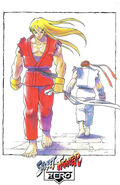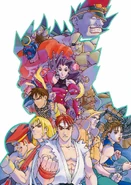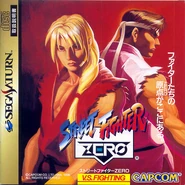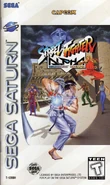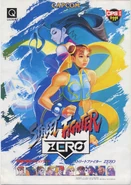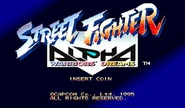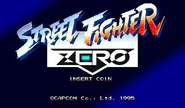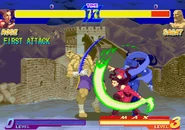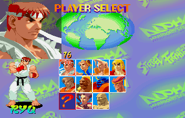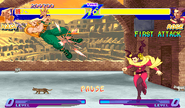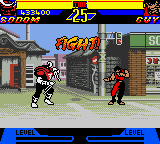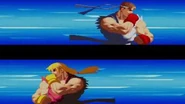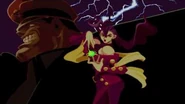Street Fighter Alpha: Warriors' Dreams, known as Street Fighter Zero (ストリートファイター ゼロ Sutorīto Faitā Zero?) in Japan, Asia, South America and Spain, is a 1995 fighting game developed and published by Capcom as the third main installment in the Street Fighter series. It was originally released for the arcade for the CPS II hardware. It was the first game in the series to be produced by Capcom since the release of Street Fighter II in 1991.
The first game in the Street Fighter Alpha series, Warriors' Dreams introduces several new features, expanding on the Super Combo system previously featured in Super Street Fighter II Turbo, with graphics drawn in the same animated style Capcom employed in Darkstalkers and X-Men: Children of the Atom.
Gameplay[]
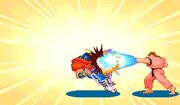
Dan defeats Sodom after using his Shinku Gadoken.
Street Fighter Alpha revamps the Super Combo system introduced in Super Street Fighter II Turbo by adding a three-level Super Combo gauge. Like in Super Turbo, the Super Combo gauge fills in as the player performs regular and special moves. When the gauge reaches Level 1 or higher, the player can perform one of their character's Super Combo techniques. The number of punch or kick buttons pressed simultaneously when performing a Super Combo determines the amount that will be used. In addition to Super Combos, the player can also perform a special counterattacking technique called Alpha Counter (Zero Counter in the Japanese version) after blocking an opponent's attack, which consumes one level of the Super Combo gauge.
There are two playing styles that can be selected after choosing a character: Normal and Auto. Auto differs from Normal in which the character will automatically guard against a limited number of attacks from their opponent, provided the character is not in the middle of performing an attack. Auto also allows the player to perform an instant Super Combo by pressing a punch and kick of the same strength simultaneously, but at expense of reducing the maximum level of the Super Combo gauge to one.
There are also new basic techniques such as Air Blocking, the ability to guard during mid-air; and Chain combos, also known as Alpha Combos, or Zero Combos in Japan, which are combos that are performed by interrupting the animation of one basic move by performing another with that of equal or greater strength. In addition to recovering from an opponent's throw, the player also has the ability to roll on the ground when they fall to the ground after an attack.
Modes[]
The single player mode consist of seven random computer-controlled opponents and a final opponent whose identity differs depending on the player's character. There are also three hidden characters in the game: Akuma, who returns from Super Turbo as an alternate final boss only after certain requirements are met, M. Bison, who serves as boss for certain characters and is also seen in some of the endings, and a new hidden character named Dan, who challenges the player during the course of the game if certain conditions are met. All three can be selected by stopping the "random fighter" option at the right time or via cheat.
The game also features a secret two-on-one Dramatic Battle mode in which two players as Ryu and Ken fight against a computer-controlled M. Bison, a mode inspired by the final fight between the characters in Street Fighter II: The Animated Movie. The Japanese arcade version of the game plays an instrumental rendition of the movie's battle theme, "Itoshisato Setsunasato Kokorozuyosato", which was replaced by Bison's regular theme in the overseas releases.
Characters[]
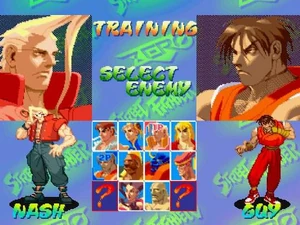
Character select screen.
The immediate character roster includes Ryu, Ken, Chun-Li, and Sagat from the Street Fighter II series, along with Birdie and Adon from the original Street Fighter, who make their first appearances as playable characters in this game. Guy, one of the main playable characters from Final Fight also appears along with Sodom, a boss character from the same game. New to the series are Charlie (Nash in the Japanese version), Guile's combat buddy who uses the same special moves, and Rose, a female fortune teller from Italy who uses a mysterious type of energy known only as Soul Power.
In addition to the ten regular characters, there are also three boss characters in the game. Street Fighter II antagonist M. Bison appears as a final opponent for many of the characters in the single-player mode, while Akuma once again appears as a secret final opponent. Another secret character, Dan (a parody joke character who is based on SNK's Ryo Sakazaki and Robert Garcia), makes his first appearance in this game. All three characters can be selected by the player by inputting a specific code for each one of them.
| Name | Location | Appearance | Summary |
|---|---|---|---|
| Adon | Thailand (day) | 
|
Adon trains to claim the title of "Muay Thai master", which he eventually gains by defeating his own former master, Sagat. |
| Akuma | China (day) | 
|
Akuma, after finishing off Ryu and Ken's master, travels the world searching for powerful opponents. In the end, Akuma triumphs over all. |
| Birdie | Italy (night) | 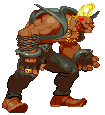
|
A street thug from England who is interested in joining Shadaloo, and sets out to prove his strength to M. Bison in order to gain full membership into the organization. |
| Charlie Nash | East USA (night) | 
|
Charlie, a member of the U.S. Air Force, is ordered by his superiors to find and arrest M. Bison for his past crimes. |
| Chun-Li | China (night) | 
|
Chun-Li is an investigator for Interpol and is looking into the death of her father. It turns out that both M. Bison of Shadaloo is responsible. She tracks down Bison, seeking revenge. |
| Dan Hibiki | Thailand (sunset) | 
|
Dan sets out to get revenge for the death of his father, Go at the hands of Sagat. |
| Guy | Japan (evening) | 
|
Guy is a modern-day ninja and the newest heir to the ancient fighting art of Bushinryu Ninjutsu. After the events of Final Fight, Guy sets out to defeat a rising evil in the world, this evil being M. Bison himself. After a tough and intense fight, Guy wins the battle against Bison and continues training in his Bushinryu Ninjutsu style, unaware that Bison is still alive and vows revenge against Guy for his shocking and unexpected defeat. |
| Ken Masters | East USA (evening) | 
|
Ken wins the U.S. Martial Arts tournament and meets Eliza during the events of the game. |
| M. Bison | West USA (day) | 
|
M. Bison is the founder and leader of the dangerous criminal organization Shadaloo. His actions involve drug trafficking, brainwashing, and violence. As a result, he and his organization have gained a lot of notoriety. |
| Rose | Italy (day) | 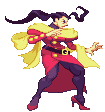
|
Rose senses an evil uprising in the world and tracks it down, the evil being M. Bison, and defeats him. |
| Ryu | Japan (day) | 
|
Ryu, after winning the first World Fighting Tournament, goes home only to discover his master Gouken had been murdered. Ryu sets out to find and defeat Akuma in order to avenge his master's death. |
| Sagat | Thailand (night) | 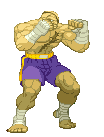
|
Sagat goes after Ryu to settle the score after Ryu had scarred his chest with a Metsu Shoryuken at the end of the original Street Fighter. |
| Sodom | West USA (night) | 
|
Sodom is looking for new recruits to join his own version of the Mad Gear Gang after losing Rolento, who had lost sight of the gang's ideals. |
Non-Playable Characters[]
- Eliza Masters (In Ken's ending)
- Andore (In Sodom's ending)
- Poison (In Sodom's ending)
- Rolento (In Sodom's ending)
- Damnd (In Sodom's ending)
- Wong Who (In Sodom's ending)
- Vega (In Sagat's ending)
- Balrog (In Sagat's ending)
Versions[]
- Ports of Street Fighter Alpha were initially released for the PlayStation and the Sega Saturn. Both versions feature an arranged soundtrack, with both versions featuring a choice between the Arranged ("Remixed" on PS1) and Original versions. In addition to a dedicated two-player Versus Mode, these ports were also the first console Street Fighter ports to feature a Training Mode, allowing players to practice their techniques and combos on a non-hostile character. The PlayStation version of Street Fighter Alpha was re-released for the PlayStation Portable and PlayStation 3 via the PlayStation Network on August 14, 2008 in North America.
- A port for Capcom's CPS Changer was also released as a mail order release in 1996 in Japan. This version is identical to the arcade version, but features different soundtrack and sounds due to hardware differences.
- A Windows PC version was released in 1998, based on the PlayStation version.
- A Game Boy Color version (ported by Crawfish Interactive) was released in 2000, featuring severely downscaled graphics and controls. The Game Boy Color version has no link cable support and is single-player only.
- The original Street Fighter Alpha and its sequels are featured in Street Fighter Alpha Anthology for the PlayStation 2. The version of Alpha in this compilation features an Arcade, Versus and Training modes like the previous PlayStation and Saturn ports, as well as a Survival and Dramatic Battle mode. The Dramatic Battle on the main menu differs from the one in the original arcade game, in which player can select any pair of characters and face against a series of four computer-controlled opponents (Adon, Sagat, M. Bison and Akuma), not just Ryu and Ken against Bison. Furthermore, the player can turn on an option to allow Super Cancels; canceling a special move into a Super Combo.
Legacy[]
Sequels[]
Street Fighter Alpha was followed by two sequels: Street Fighter Alpha 2 in 1996 and Street Fighter Alpha 3 in 1998. Like Alpha, the two games were originally released for the arcades, followed by a few updated editions and home versions. All three games in the series and their variations were included in the PlayStation 2 compilation Street Fighter Alpha Anthology, released in 2006.
Related media[]
A manga adaptation based on the original Alpha and Alpha 2 by Masahiko Nakahira was published in Gamest from 1995 to 1996 and was later adapted into English by UDON in 2007. It was followed by two different animated adaptations: Street Fighter Alpha: The Animation in 2000 and Street Fighter Alpha: Generations in 2005.
Trivia[]
- This story of the first chapter in the Alpha series is no longer canon, as the game in general is developed as a prototype to Street Fighter Alpha 2.
- In the arcade's 1-Player mode, CPU-controlled characters will sometimes use their special attack three times in a row (first the weak version, then medium, then strong) randomly in battle. This is most noticeable, in particular, with Ken.
- Immediately after defeating a foe, within the time the announcer says "KO", there is a small time window that allows moving the character or making an attack, unlike in other games where characters can no longer move.
- The game was originally going to be developed for the Super Famicom in 1996, and it was going to be called Street Fighter Classic, but scheduling for this was dropped and the project went under an overhaul after the announcement of their new ambition which is Street Fighter Alpha 2 for the SFC.[1]
- On Ryu and Guy's stage, there is a poster advertising Street Fighter II: The Animated Movie in the far right corner.
- European versions of the PlayStation port included demo disks of Resident Evil.
- The home console versions have the option to choose between the original arcade and arranged versions of the soundtrack, a feature not seen in virtually every other game in the series.
- Oddly, the game keeps track of the # hit combos and reversals of the CPU foe as well as the player. Bonuses can clearly be seen given, and "Great!", "First attack!" and the like can be seen given for the computer's combos, though the points are hidden.
Gallery[]
Promotional art and packaging[]
Official art[]
- To view all official character artwork, see: Official Art.
Screenshots[]
Videos[]
References[]
External Links[]
| Street Fighter Alpha Characters | ||||
|---|---|---|---|---|
| Alpha | Adon · Akuma · Birdie · Charlie · Chun-Li · Dan · Guy Ken · M. Bison · Rose · Ryu · Sagat · Sodom | |||
| Alpha 2 | Original | Dhalsim · Evil Ryu · Gen · Rolento · Sakura · Zangief | ||
| Console | Shin Akuma | |||
| Gold | Cammy | |||
| Alpha 3 | Original | Balrog · Blanka · Cody · E. Honda · Juli · Juni · Karin · R. Mika · Vega | ||
| Console | Dee Jay · Fei Long · Guile · T. Hawk | |||
| Upper | Eagle · Maki · Yun | |||
| MAX | Ingrid | |||

